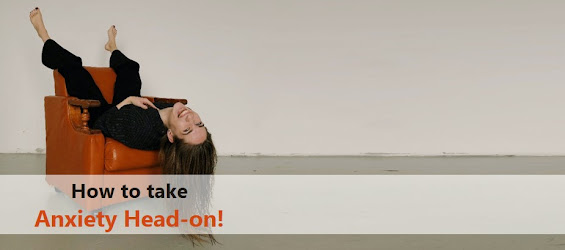HOW TO TAKE ANXIETY HEAD-ON!
Anxiety is among the most common mental health issues. 1 out of 4 people in India suffers from anxiety, stress, and depression. The worst part is, hoping for the anxiety remedies and/or relief is not sufficient. To tackle anxiety head-on, you need to understand a few things:
·
What
is anxiety after all
·
Check
if you are anxious, take an anxiety test
·
Learn,
how you can relieve your anxiety (self-help)
1. What is
Anxiety?
Anxiety is our body’s natural response to stress or stressful conditions. It can be a feeling of fear or apprehension; or ‘butterflies in the stomach’ due to situations like appearing for a job interview or making a public speech. This is normal indeed; and there’s nothing to worry. However, if the feeling of anxiety persists longer, say 6 months or more, and also start interfering with your daily life, you probably have an anxiety disorder.
1.1 Anxiety Disorders:
Anxiety
disorders are group of symptoms or mental illnesses that cause constant and
overwhelming anxiety and fear. Excessive
anxiety can make you avoid or even give up your job, work, school, family
get-togethers, and other social situations that might trigger or worsen your
symptoms.
1.2 Types of Anxiety Disorders
There
are several types of anxiety disorders:
· Generalized anxiety disorder. You feel excessive, unrealistic worry and tension even if there is no or a little reason.
· Panic disorder. You start feeling panicky all of a sudden; with intense fear. This is called a Panic Attack. During such an attack, you may feel palpitations, heavy respiration, sweating, upset stomach, nausea or even a chest pain. In worst cases, you may even feel like you are choking or having a heart attack.
· Social anxiety disorder or social phobia. In such a case, you tend to feel overwhelming worry, or over thinking and become self-conscious about every social situation, small or big. You unnecessarily worry thinking that others are observing or judging you; or that you may embarrass yourself. You feel unnecessary nervousness talking to people.
· Specific phobias. This is an anxiety towards a very specific object, trigger or a situation, such as fire or flying. When it is a daily life condition, it can affect you a lot. For example, if flying frequently is your routine job requirement, and if you have anxiety related to flying, it can impact you badly, causing an anxiety disorder.
· Agoraphobia. This means an extreme or irrational fear of entering open or crowded places, or of being in places or situations where escape could be difficult. People with agoraphobia feel very uncomfortable and unsafe in public places, especially where crowds gather. They may feel the need of a companion, such as a relative or friend, to go to such places. The fear could be overwhelming enough to prevent them from leaving their home.
· Separation anxiety. You keep feeling anxious or fearful about your loved ones leaving you. This happens even in a condition when a person you are close to is away somewhere. You keep feeling fearful about something happening wrong with that person or he or she leaves you forever.
1.3 Symptoms of Anxiety Disorders
Common
symptoms are:
· Fear, worry, panic and uneasiness
· Disturbed sleep
·
Excessing
or repetitive thinking about the problem; or having repeated negative and
fearful thoughts (also called rumination)
·
Not
able to stay calm and relaxed
·
Cold,
sweaty, numb, or tingling hands and feet
·
Breathing the difficulty, shortness of breath, breathing faster than normal, or a feeling of
choking
·
Chest
pain
·
Pounding
heartbeat (palpitations)
·
Dry
mouth, bad breath
·
Nausea
·
Tensed
muscles, vague pains
·
Dizziness,
feeling sleepy through the day, causing loss of concentration or focus
· Intensely or obsessively avoiding feared objects or places
1.4 Causes of Anxiety Disorders
Some
causes of anxiety disorders are:
·
Genetics
·
Brain
chemistry
·
Environmental
stress
·
Drug
withdrawal or misuse or addiction
·
Certain
medical conditions
1.5 Risk factors of Anxiety Disorders
·
History
of mental health disorders
·
Physical,
emotional or sexual abuse during childhood
·
Trauma
or specific painful/negative life event(s) in the past
·
Severe
illness or chronic health conditions, particularly heart diseases or cancer or
other severe life-threatening illness
·
Alcohol
or drug
·
Being
shy as a child
·
Low
self-esteem due to the negative academic, social or professional event(s)
2. Check if you
are anxious, take an anxiety test
Developed in 1959 by Dr. M. Hamilton, the HAM-A is an anxiety scale that’s been proven useful for individual people; and also for research involving many patients.
This was one of the first scales developed to measure the severity of anxiety symptoms; and is widely used even today in clinical as well as research settings.
The scale consists of 14 items, each defined by a series of symptoms. It measures both psychic anxiety (mental agitation and psychological distress) and somatic anxiety (physical complaints related to anxiety).
It’s
easy and quick to use. You can check your anxiety score by clicking on the
following link.
3. Learn, how you
can relieve your anxiety (self-help)
In
case, while doing a self-test, you realize you are having an anxiety disorder,
The first thing is to consult your physician. However, the following things
could be of help too
·
Keep
a diary handy, note down the thoughts as they arise
·
Talk
to someone you trust
·
Practice
focused, deep breathing
·
Try
to manage your worries and worrisome thoughts
·
Indulge
in your hobbies
·
Exercise
regularly. Even mental exercise like writing or painting can be of great help
·
Try
meditation. Start with short, guided meditations
·
Try
a relaxing massage or aromatherapy
·
Spend
more time with your family and friends
·
Know
what relaxes you the most; and keep doing that frequently
Content source:
· www.webmd.com · https://www.mdcalc.com/hamilton-anxiety-scale#evidence




Comments
Post a Comment